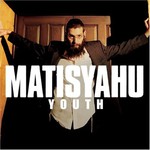Youth
Studio Album by Matisyahu released in 2006Youth review
This outing finds Matisyahu backed by his Live at Stubb’s ensemble
When Matisyahu (born Matthew Miller) emerged with his debut album, Shake Off the Dust...Arise, in 2004, his musical persona seemed to some a novelty. Here was a Hasidic Jew, dressed in a black suit with a broad-brimmed black hat worn over a yarmulke, and sporting a full, untrimmed beard, who nevertheless performed toasting raps about the glories of traditional Judaism over reggae beats in a dancehall style directly from Jamaica. It may have seemed like a joke at first, but Matisyahu was serious, and he began to attract press notices to go with the enthusiastic audiences that packed his concerts. Following up his much-heralded live album and a prominent guest appearance on P.O.D.’s Testify, Hasidic reggae singer unveiled his major-label studio debut, Youth, in early 2006. Primarily produced by Bill Laswell (something of an avant-garde equivalent to Rick Rubin), this outing finds Matisyahu backed by his Live at Stubb’s ensemble (here dubbed Roots Tonic), which can turn on a dime from dancehall to heavy rock. Youth is a huge step forward for Matisyahu and clearly shows his growth and enormous potential. Matisyahu's singing and the substance of his songs (spiritual living, self-awareness, the value of knowledge and learning, kindness to others) are presented with a loving sincerity, and buoyed by tremendous musicianship.
Themes of exile, hope and redemption suffuse this musically varied collection
The recent success of Damian "Jr. Gong" Marley's Grammy-winning Welcome to Jamrock has certainly piqued the mainstream's curiosity in reggae music. Matisyahu’s Youth is the album that should take that interest to the next level. Themes of exile, hope and redemption suffuse this musically varied collection. Permeating the songs is the search for life's meaning in a dangerous, material world. Youth is solid from start to finish, and it's diverse enough to appeal to several different groups of music fans. Slick tracks like Time of Your Song have definite Top-40 potential. Hip-hop heads will appreciate the beatboxing and the rap-like delivery found on tunes like Dispatch the Troups. The opener, Fire of Heaven/Altar of Earth, possesses a jam-band-friendly vibe that should draw fans of Phish, a band that Matisyahu once followed. It is replete with widely, though perhaps differently, understood references to Zion and Babylon. Just about everything on the disc sounds like it would work in the dance club. The album keeps raising the temperature until it hits What I'm Fighting For, a quiet acoustic number that relies on little more than Matisyahu's voice, a guitar, and an understated keyboard. From there, the message remains the same but the music keeps changing.
Youth is a compelling mix of ancient and modern sounds and ideas
It’s been a ridiculously exciting year for Matisyahu and his bandmates. Since the release of his 2004 debut, Shake Off the Dust...Arise, and the phenomenal success of last year's Live At Stubb's, Matisyahu has continued to bring his uncanny, electrifying fusion of orthodox Judaism and classic reggae music to us with unbelievable energy. Youth is a compelling mix of ancient and modern sounds and ideas. Free of any proselytizing, this melding of Talmudic teachings and Jamaican rhythms flows so naturally that it underscores the shared roots of the two cultures. Matisyahu presents his unusual musical hybrid with passion, proving that his attempts to reach out and transcend musical and cultural boundaries are, if nothing else, genuine. Regardless of religious affiliation, most artists will tell you that the creative force is special type of divinity that moves through them. Matisyahu simply seeks to serve as a conduit for the messages of peace and unity that flow through him, to improve the world by sharing his music, and without letting ego or worldly desires interfere in that communication. And with Youth, he makes a quantum leap closer to attaining it. Learn how to pronounce this artist's name – Mah-tis-yah-who – you'll be reading it often in 2006.

